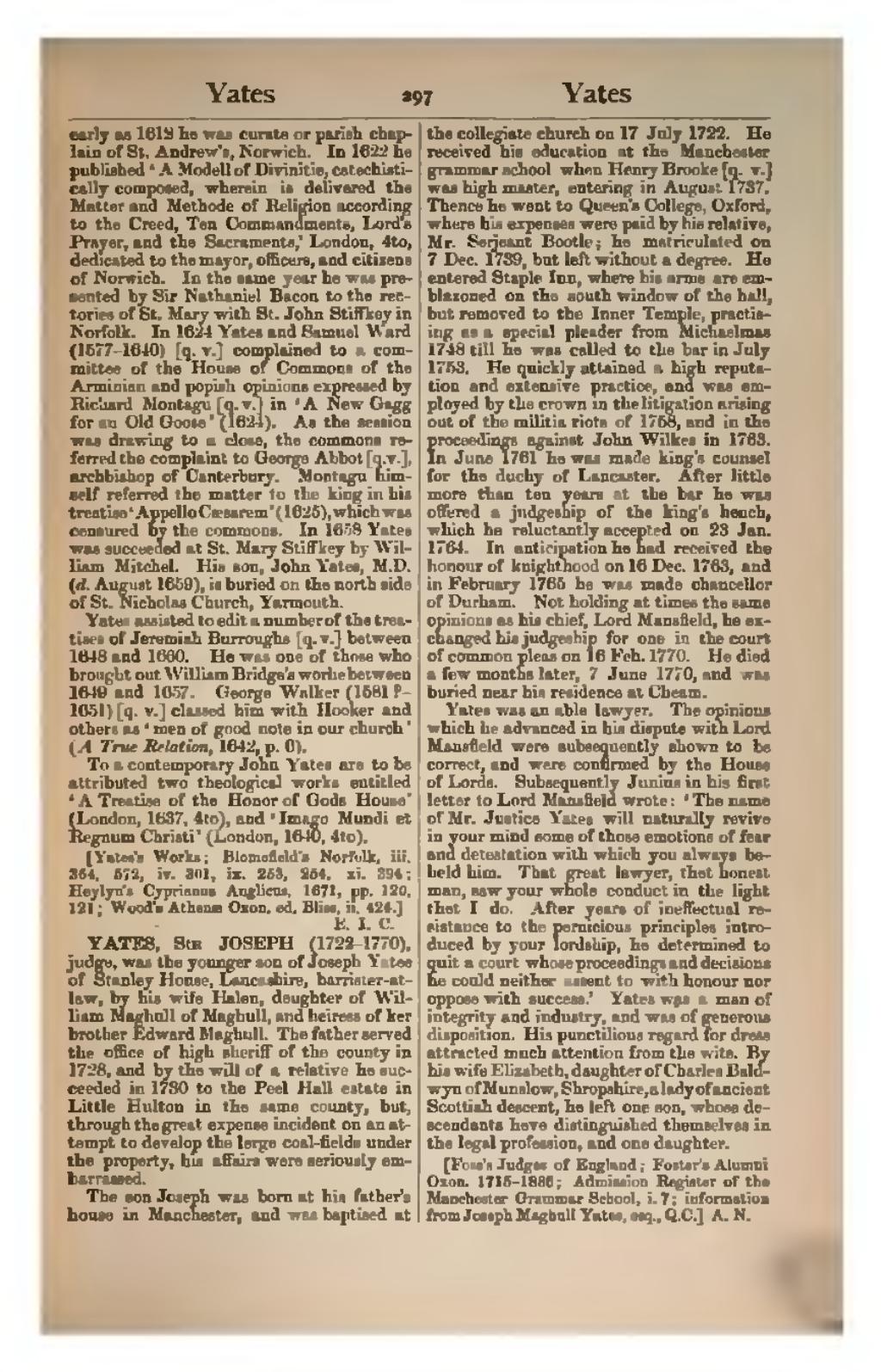early as 1612 he was curate or parish chaplain of St. Andrew's, Norwich. In 1622 he published ‘A Modell of Divinitie, catechistically composed, wherein is delivered the Matter and Methode of Religion according to the Creed, Ten Commandments, Lord's Prayer, and the Sacraments,’ London, 4to, dedicated to the mayor, officers, and citizens of Norwich. In the same year he was presented by Sir Nathaniel Bacon to the rectories of St. Mary with St. John Stiffkey in Norfolk. In 1624 Yates and Samuel Ward (1577–1640) [q. v.] complained to a committee of the House of Commons of the Arminian and popish opinions expressed by Richard Montagu [q. v.] in ‘A New Gagg for an Old Goose’ (1624). As the session was drawing to a close, the commons referred the complaint to George Abbot [q. v.], archbishop of Canterbury. Montagu himself referred the matter to the king in his treatise ‘Appello Cæsarem’ (1625), which was censured by the commons. In 1658 Yates was succeeded at St. Mary Stiffkey by William Mitchel. His son, John Yates, M.D. (d. August 1659), is buried on the north side of St. Nicholas Church, Yarmouth.
Yates assisted to edit a number of the treatises of Jeremiah Burroughs [q. v.] between 1648 and 1660. He was one of those who brought out William Bridge's works between 1649 and 1657. George Walker (1581?–1651) [q. v.] classed him with Hooker and others as ‘men of good note in our church’ (A True Relation, 1642, p. 6).
To a contemporary John Yates are to be attributed two theological works entitled ‘A Treatise of the Honor of Gods House’ (London, 1637, 4to), and ‘Imago Mundi et Regnum Christi’ (London, 1640, 4to).
[Yates's Works; Blomefield's Norfolk, iii. 364, 572, iv. 301, ix. 253, 254, xi. 394; Heylyn's Cyprianus Anglicus, 1671, pp. 120, 121; Wood's Athenæ Oxon. ed. Bliss, ii. 424.]
YATES, Sir JOSEPH (1722–1770), judge, was the younger son of Joseph Yates of Stanley House, Lancashire, barrister-at-law, by his wife Helen, daughter of William Maghull of Maghull, and heiress of her brother Edward Maghull. The father served the office of high sheriff of the county in 1728, and by the will of a relative he succeeded in 1730 to the Peel Hall estate in Little Hulton in the same county, but, through the great expense incident on an attempt to develop the large coal-fields under the property, his affairs were seriously embarrassed.
The son Joseph was born at his father's house in Manchester, and was baptised at the collegiate church on 17 July 1722. He received his education at the Manchester grammar school when Henry Brooke [q. v.] was high master, entering in August 1737. Thence he went to Queen's College, Oxford, where his expenses were paid by his relative, Mr. Serjeant Bootle; he matriculated on 7 Dec. 1739, but left without a degree. He entered Staple Inn, where his arms are emblazoned on the south window of the hall, but removed to the Inner Temple, practising as a special pleader from Michaelmas 1748 till he was called to the bar in July 1753. He quickly attained a high reputation and extensive practice, and was employed by the crown in the litigation arising out of the militia riots of 1758, and in the proceedings against John Wilkes in 1763. In June 1761 he was made king's counsel for the duchy of Lancaster. After little more than ten years at the bar he was offered a judgeship of the king's bench, which he reluctantly accepted on 23 Jan. 1764. In anticipation he had received the honour of knighthood on 16 Dec. 1763, and in February 1765 he was made chancellor of Durham. Not holding at times the same opinions as his chief, Lord Mansfield, he exchanged his judgeship for one in the court of common pleas on 16 Feb. 1770. He died a few months later, 7 June 1770, and was buried near his residence at Cheam.
Yates was an able lawyer. The opinions which he advanced in his dispute with Lord Mansfield were subsequently shown to be correct, and were confirmed by the House of Lords. Subsequently Junius in his first letter to Lord Mansfield wrote: ‘The name of Mr. Justice Yates will naturally revive in your mind some of those emotions of fear and detestation with which you always beheld him. That great lawyer, that honest man, saw your whole conduct in the light that I do. After years of ineffectual resistance to the pernicious principles introduced by your lordship, he determined to quit a court whose proceedings and decisions he could neither assent to with honour nor oppose with success.’ Yates was a man of integrity and industry, and was of generous disposition. His punctilious regard for dress attracted much attention from the wits. By his wife Elizabeth, daughter of Charles Baldwyn of Munslow, Shropshire, a lady of ancient Scottish descent, he left one son, whose descendants have distinguished themselves in the legal profession, and one daughter.
[Foss's Judges of England; Foster's Alumni Oxon. 1715–1886; Admission Register of the Manchester Grammar School, i. 7; information from Joseph Maghull Yates, esq., Q.C.]
